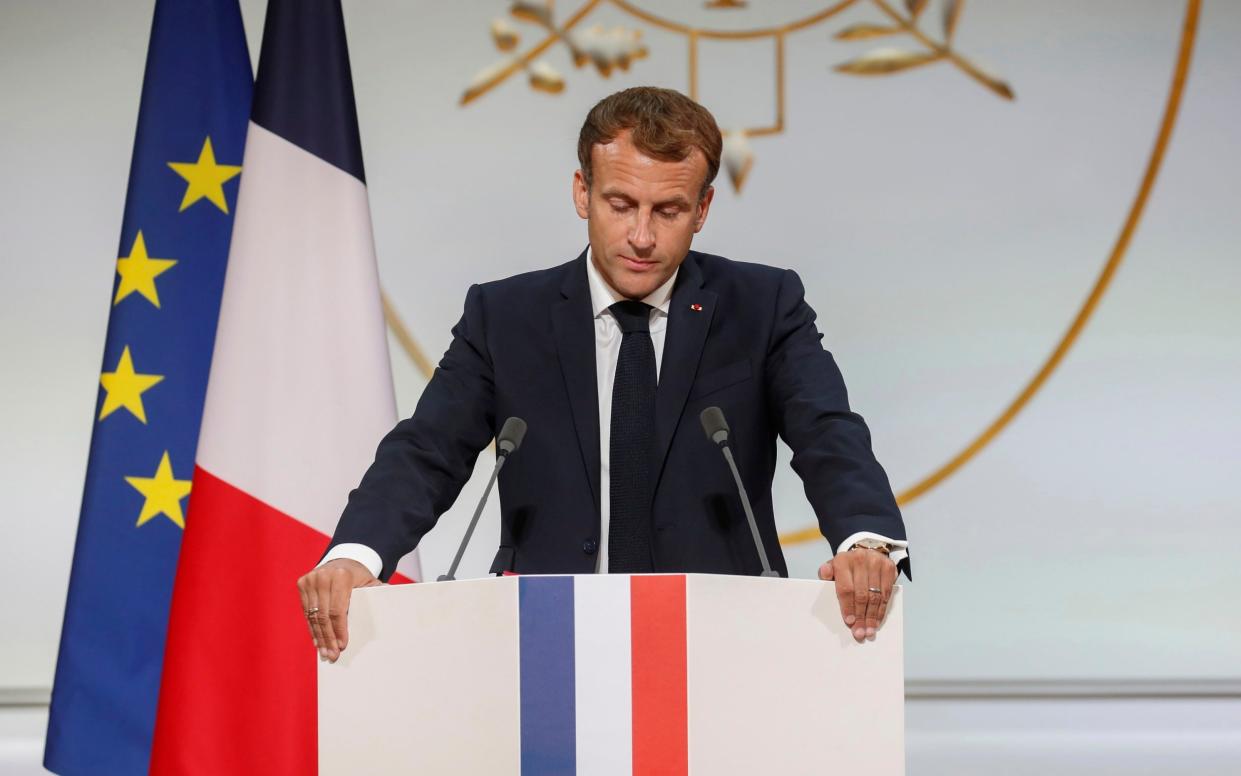Emmanuel Macron's vision of French supremacy is dead in the water

France's submarine fiasco has proved a rude awakening over its limited clout on the world stage.
Australia announced last week that it was scrapping a $40 billion submarine-building deal with France in favour of a new security pact with the UK and the US, dubbed Aukus, prompting the French to recall two of its ambassadors in fury.
France has also now cancelled a defence summit with the UK.
The incident has undoubtedly clipped Emmanuel Macron’s pretensions to embody Gallic grandeur at a truly awkward moment; just seven months before presidential elections in which French déclassement - its drop in global rankings - promises to play a prominent role.
Cue Marine Le Pen and her maverick far-Right potential rival Eric Zemmour rubbing their hands with glee.
Little wonder that Mr Maron - a man who prefers projecting the image of a swashbuckling Bonapartist to an overlooked “junior partner”, as one of his ministers dubbed Britain - has kept his personal periscope well out of this naval battle, leaving his foreign and Europe ministers to mount the attack.
The president, hardly shy at rolling out the Versailles red carpet, “prefers to be the bearer of good news”, noted one defence source.
Anger over Aukus security pact
It would be disingenuous not to comprehend France’s genuine fury at what it has described as “lying, duplicity, a major breach of trust and contempt” by three major allies. Just picture the reverse had the UK been cut out of a mega-defence deal between Australia, America and another European power.
And those who ask what all the fuss is about over a commercial contract - albeit huge - with France's Naval Group are clearly missing the point.
This was a strategic defence partnership in a zone - the Indo-Pacific - where France has genuine national interests: almost two million French citizens live in the area, notably in French territories such as French Polynesia and New Caledonia.
Watch: EU backs France in submarine dispute
But beyond the tactical setback, the blow has inflicted a far deeper wound on the Gallic political psyche in a country that views itself as a universal force to be reckoned with.
After the 1956 Suez crisis when Britain, without informing its French ally, acceded to a US ultimatum by agreeing to a ceasefire in the Suez Canal zone, both countries realised they no longer ruled the waves.
The UK chose the special relationship. Charles de Gaulle struck out alone, summing up his position as: “France must continue to behave like a great power precisely because she no longer is one.”
The sunk sub deal is a painful reminder that for France, the emperor has no clothes - le roi est nu.
Indeed, Mr Macron had clearly hoped to position France as a separate player in the great game between the US and China in a bid to temper the bellicose tendencies of both in the area.
It is just the sort of line his forebear De Gaulle would have toed. These ambitions of being an “ally, not aligned” have been brutally cut down to size.
After the Suez debacle, the West German chancellor Konrad Adenauer reassured France that “Europe will be your revenge”.
However, here again, the French president faces a reality check.
Further humiliations on the horizon?
For all his pretensions over European autonomy, including in defence amid recent claims that Nato is “brain dead”, the lack of expressions of solidarity from European friends has been striking.
For example, France is now facing the humiliating prospect of further military deal cancellations.
“There are real concerns here that Germany could decide to abandon the future combat air system (a next-generation French, German and Spanish fighter jet) and buy American F35s,” said Jean-Dominique Merchet, defence expert at L’Opinion.
And some EU allies will no doubt be irked by France's latest unilateral threat to rule out EU trade talks with Australia after a minister called it “unthinkable” in the current climate - a fairly emperor-like response.
At any rate, Mr Macron will certainly have his work cut out when France takes over the rotating presidency of the EU next January.
As for its relations with the US, France now runs the risk of punching itself into a corner with an ally it can ill afford to alienate. It will be interesting to see what tone it sets at the UN General Assembly meeting this week. Mr Macron will not be present.
As Bertrand Badie, an international relations professor at the Sciences Po, put it: “When you get into a crisis like this, you'd better know where the exit is.”
Watch: 'Hotel Rwanda' hero sentenced to 25 years on terror charges

 Yahoo News
Yahoo News 
